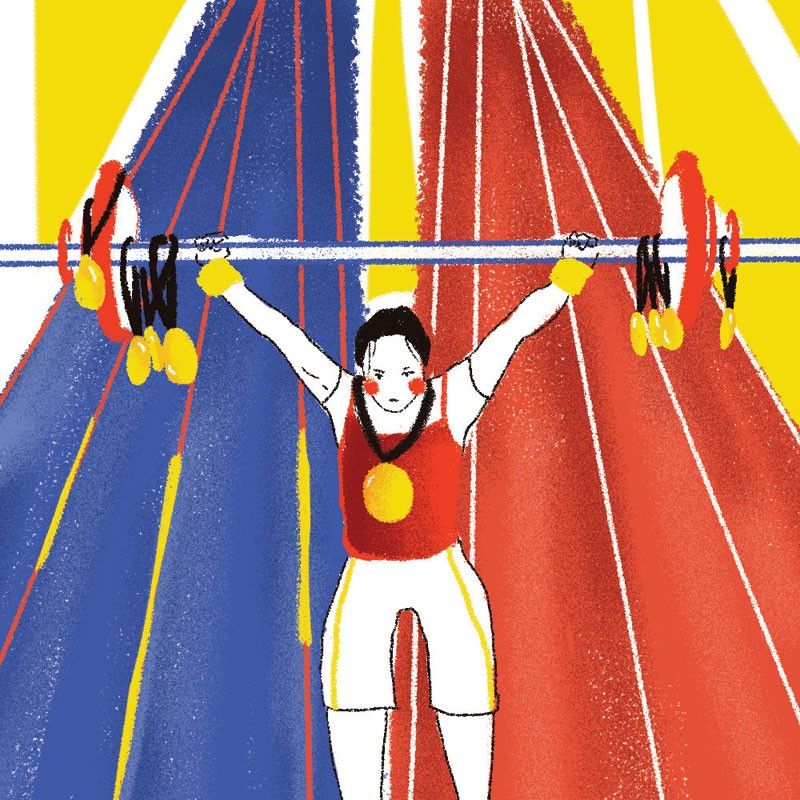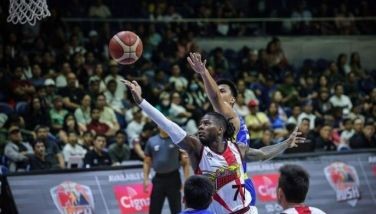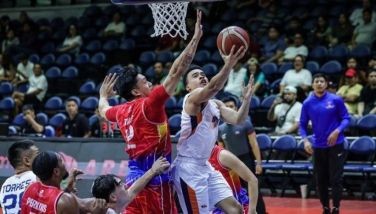The quest for the first Olympic gold medal

MANILA, Philippines — Ever since the Philippines began to compete in the Olympics in 1924, there have been only 10 medals harvested by Filipino athletes, and none was a gold. Thrice, the Philippines came close to hitting pay dirt. Featherweight boxer Anthony Villanueva settled for the silver after losing a highly-disputed split decision to Russia’s Stanislav Stepashkin in the 1964 Tokyo final. Light flyweight boxer Manseuto “Onyok” Velasco brought home a silver from the 1996 Olympics in Atlanta, bowing to Bulgaria’s Daniel Bozhilov Petrov on a 19-6 verdict and weightlifter Hidilyn Diaz took second place in the women’s 53-kilogram division at the 2016 Rio Games.
Five of the 10 medals were from boxing. Villanueva’s father Jose broke the ice with a bronze in the bantamweight division in the 1932 Los Angeles Olympics. The two other medals in boxing were bronze in the light flyweight category with Leopoldo Serrantes in Seoul in 1988 and Roel Velasco in Barcelona in 1992. Two families were credited for the haul — the Villanuevas with father Jose and son Anthony, and the Velasco brothers.
Swimmer Teofilo Yldefonso was the only Filipino to mount the podium twice with bronze medals in the men’s 200-meter breaststroke in Amsterdam in 1928 and in Los Angeles in 1932. Simeon Toribio contributed a bronze in the men’s high jump in 1932, and Miguel White finished third in the men’s 400-meter hurdles in Berlin in 1936.
The Philippines is second in the list of countries showing the most Olympic medals without a gold. Malaysia is first with 11 medals (seven silver, four bronze) compared to the Philippines’ 10 (three silver, seven bronze). Neighboring nations Vietnam, Singapore, and Hong Kong are in the honor roll with a gold each. Southeast Asian rivals Thailand has collected nine golds (four from men’s boxing, five from women’s weightlifting) and Indonesia seven (all from badminton).
Philippine Sports Commission (PSC) chairman and the coming SEA Games chef de mission Butch Ramirez said the chances of the Philippines capturing a gold in the 2020 Tokyo Games are slim, but he’s not discounting the possibility. “Hidilyn is our No. 1 bet,” he said, referring to the 28-year-old weightlifter who’s vying to compete in her fourth Olympics. “It took Hidilyn three Olympic cycles to win her first medal, dropping down from the 58-kilogram class to 53. But first, Hidilyn must qualify for Tokyo. It’s a long qualifying process, and we hope she makes it. So far, she’s on track. We’re focusing on individual sports where there are weight classifications like judo, taekwondo, and boxing. Half-Filipina, half-Japanese Kiyomi Watanabe is a three-time SEA Games gold medalist and an Asian Games silver medalist. She’s very disciplined; she works hard. Her concept of family is inspiring. She might be a surprise in judo. Pauline Lopez is a contender in taekwondo. Margie Didal is only 20 and won gold in skateboarding at the last Asian Games. Skateboarding is at a different level in the US and Europe, but Margie has a chance. Caloy Yulo of gymnastics has been making waves around the world, he could be headed for a podium finish. Surfing will be introduced in Tokyo and our surfing president Dr. George Canlas could produce a qualifier and a potential medalist.”
How the Filipino athletes in Olympic sports perform in the coming SEA Games will be a gauge of reasonable expectations in Tokyo. “It all boils down to National Sports Assocition (NSA) leadership,” said Ramirez. “Some of our NSAs turn to Fil-foreigners for a quick fix. I’m not against recruiting Fil-foreigners, but I think the key is to set a direction with a program of development from the grassroots up. Identifying focus sports is a priority. Look at the success of Kenya, Jamaica, and Nigeria in athletics. The Japanese have the same height as Filipinos but why are they world-class and we’re struggling. When Michael Phelps was a boy, the U.S. Olympic Committee already knew he would become a champion swimmer and got him on the road to develop early. Countries like Kosova and Mongolia have already won gold medals, and we’re still looking for our first. We need a radical change in our outlook. The Philippine Olympic Comittee (POC) is highly politicized. I view the role of an NSA president as providing support when necessary and the secretary-general as a dedicated, full-time implementer of programs.”
Aside from leadership, Ramirez said funding is a major issue that could make or break Philippine sports. “Right now, the PSC receives about P100 to P120 million a month from PAGCOR even as the law states PAGCOR must remit five percent of gross revenues, which is about P200 million a month. We used to receive only P24 to 30 million a month. Aside from PAGCOR, the PSC receives about P250 million a year from other sources like the PCSO. Our annual budget to support sports is P600 million, and this year, we’ve added P600 million more to prepare for the SEA Games and the Olympics. That totals what we receive from PAGCOR a year. We also take care of dorm facilities, food, venues, foreign trips, hotel expenses, and uniforms twice a year.”
Ramirez said if the government created a Department of Sports, it would be a major advantage. He said the strength of the grassroots is the strength of the elite athletes and that investing in Filipino coaches is imperative.
Former POC president Ricky Vargas agreed with Ramirez that a Department of Sports is necessary. “I’m suggesting a Department of Youth and Sports Development,” he said. “It will be an organization of influence to government. The secretary will occupy a Cabinet position, co-equal with other Cabinet Secretaries. The department will go through the budget process and may also receive assistance from PAGCOR. The functions should be in the areas of development, facilities, and logistics, training from grassroots to elite and education. It will be like the former Gintong Alay. There will be an intersection with the POC. I think there should be only one leader in sports. The POC has too many divergent interests and must abide by the strategy of the department. But the POC, as the private entity recognized by the IOC, will continue to be responsible for certifying athletes for the SEA Games, Asian Games, and Olympics, representing the country in the Olympic Council of Asia and IOC and governing the NSAs, which are the source of our athletes.”
Vargas said shooting for an Olympic gold medal is a challenge. “We’re not a rich country,” he said. “It takes millions and millions of dollars to get a gold medal. In 2020, we’re hoping for a medal from skateboarding, weightlifting, boxing, gymnastics, judo and maybe, golf. If we won one medal in Rio, I think we can get more than one in Tokyo. So far, there are no qualifiers set for boxing because the IOC has disallowed AIBA from getting involved. They’ve eliminated the light-flyweight division, so we’ve got at least three top fighters in contention to represent us in the flyweight class. In the future, I hope to see potential medalists from archery and shooting.”
Vargas said the first Filipino Olympic gold medalist must be a full-time athlete. “The gold will come from a weight-classified sport that is pure skills-based, not judgmental or subjective,” he said. “I agree with Chairman Butch that we need to upgrade our coaching ranks. Our coaches and trainers are the first inspiration of our athletes. They’re the closest to our athletes, they take care of them. We also need to professional governance and get the right people in the NSAs. My vision is to prepare our athletes of today to become our sports leaders of tomorrow. We’re now sending athletes to workshops abroad so they can be trained early to take over leadership roles in the future.”
Ramirez said the country is hungry for an Olympic gold medal. “One man can’t do the job alone,” he said. “We must work together in unity. I’ve visited Cuba twice. I’ve observed how sports is managed in Australia, China, the US, and the UK. There is no such thing as total independence. The IOC itself adheres to the concept of government support for sports. The USOC, for instance, submits a report to the US Congress for transparency. In the Philippine context, the marriage between the PSC and POC is doomed to fail. The POC is an independent entity with NSAs where leadership is essential while the PSC has supervisory and visitorial powers as a government agency that provides funding for sports. If NSAs have unliquidated advances and show traces of questionable transactions, the PSC will move in. That’s the nature of our job. Collaboration is vital for the country to succeed in sports.”
* * *
Joaquin Henson is a multi-awarded sports journalist and broadcaster with an outstanding resume in the media industry. He is called “The Dean” for his encyclopaedic knowledge of sports.
- Latest
- Trending
































